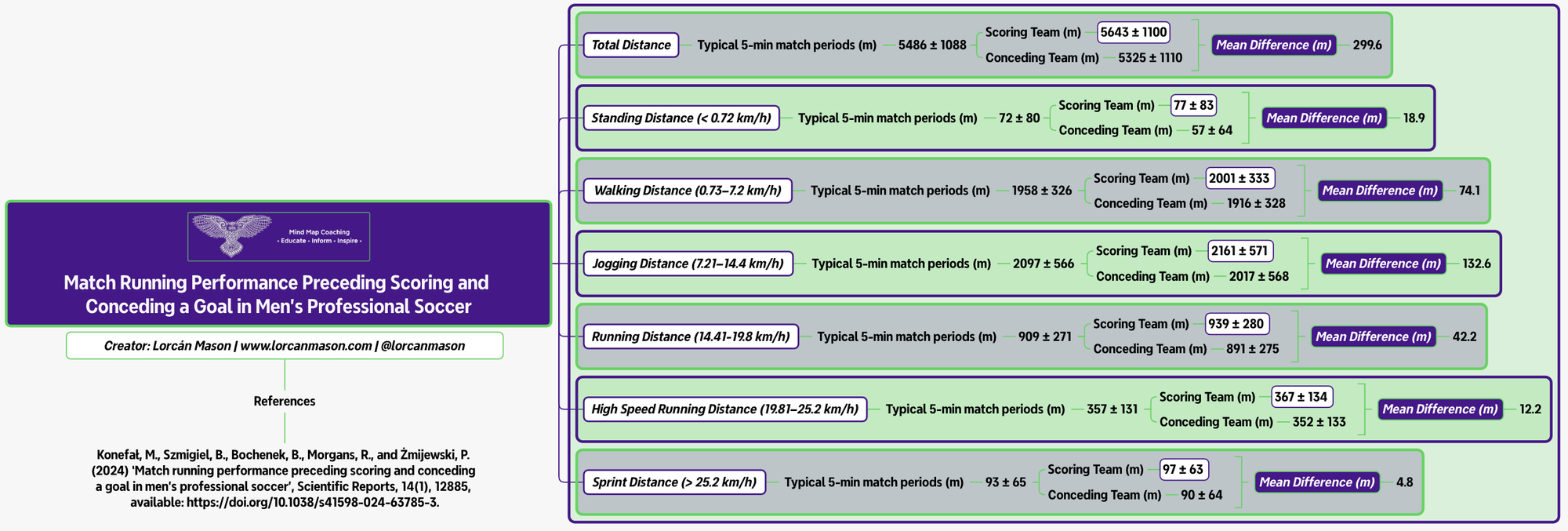Match Running Performance Preceding Scoring and Conceding a Goal in Men’s Professional Soccer
Within the 5 min period before scoring a goal, teams covered significantly greater distance at low- and medium-intensity when compared to before conceding a goal.

The performance of players during a soccer match is significantly impacted by various factors such as the current status of the match, the anticipated outcome, and the quality of the opposing team. It is commonly observed that teams with a higher ranking tend to exhibit a greater level of running and sprinting compared to teams positioned lower in the rankings. Interestingly, teams often display increased running activity following the concession of a goal. Moreover, elite soccer athletes are noted to exert more effort in defensive maneuvers while showing a decrease in offensive actions. Notably, the physical intensity exhibited by players is heightened during attempts to regain possession of the ball as opposed to when they are in control of it. Furthermore, strategies related to ball possession can vary significantly across different soccer leagues, adding another layer of complexity to the overall performance dynamics.
The critical interplay between physical performance and the status of the match cannot be overstated. Even in cases where a team is leading, there remains a possibility of a sudden turn of events resulting in a loss, underscoring the pivotal nature of key moments during gameplay. Consequently, a detailed examination of these crucial moments becomes imperative as they wield a substantial influence on the ultimate outcome of the match. Researchers are actively engaged in investigating how a team's physical capabilities evolve in the moments leading up to either scoring a goal or conceding one, with findings suggesting that intense bursts of activity can lead to a decline in running performance within a short span of 5 minutes. By gaining a deeper understanding of these performance dynamics, coaches can fine-tune their strategies to enhance team performance and adequately prepare players for scenarios where they need to either score or defend against goals effectively. The current study is dedicated to exploring the variations in running performance observed within the 5 minutes preceding a goal in professional soccer matches in Poland, with a hypothesis suggesting that these variations are contingent upon the intensity and nature of player activities.
The study utilized the TRACAB computerized tracking system to record match running performance in the Polish Ekstraklasa during the 2022/23 season. This system provided detailed data on player movements during official league matches. Data collection covered 278 matches with a total of 570 goals scored, ensuring a comprehensive analysis of performance metrics across a significant portion of the season. Match data was segmented into 5-minute intervals, allowing for a focused analysis of player performance in the critical moments leading up to a goal being scored or conceded. The study specifically analyzed various distances covered by players, including total distance, standing, walking, jogging, running, high-speed running, and sprinting, to identify differences in physical exertion between teams that scored and those that conceded goals. Linear mixed models were employed to compare the match running performance metrics between the scoring and conceding teams, highlighting the physical performance factors that could influence goal-scoring opportunities. The findings aimed to enhance the understanding of key physical performance factors that contribute to scoring goals, offering insights that could help optimize training and improve overall team performance.
The results of the current research indicate that all examined metrics of match running performance were higher in the scoring teams compared to the conceding teams. Within the 5 min period before scoring a goal, teams covered significantly greater distance at low- and medium-intensity when compared to before conceding a goal. These findings suggest that pre-scoring and pre-conceding situations in soccer are characterised by different running behaviours. Therefore, coaches and performance staff should tailor within game tactical strategies based on significant situational moments such as scoring or conceding a goal, to optimise player and team match-play performance. To enhance the effectiveness of soccer training and match-play, coaching and performance staff should consider the present findings when evaluating team behaviours, that indicate an increase in the volume of medium- and low-intensity running efforts preceding a goal.
Reference
Konefał, M., Szmigiel, B., Bochenek, B., Morgans, R., and Żmijewski, P. (2024) ‘Match running performance preceding scoring and conceding a goal in men’s professional soccer’, Scientific Reports, 14(1), 12885, available: https://doi.org/10.1038/s41598-024-63785-3.

